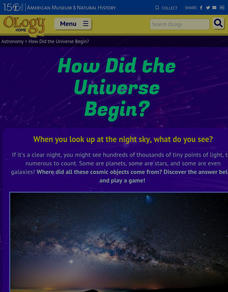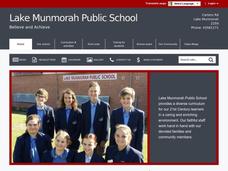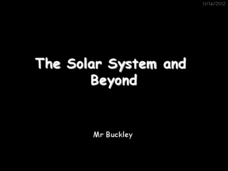Curated OER
Black Holes...V
In this black hole worksheet, students read about the black hole in the center of the Milky Way Galaxy called Sagittarius A and observe a Chandra image of the area where the black hole exists. Students solve two problems which include...
American Museum of Natural History
How Did the Universe Begin?
The Big Bang Theory is more than a television show. Pupils read how Edwin Hubble observed other galaxies and noticed that the galaxies are moving away from each other. Scholars learn about the idea of the big bang and what happened next...
Space Awareness
Living in the Milky Way
Get to know our galaxy with an astronomy-themed, hands-on activity. Scholars watch an informative video, answer questions, and construct a model of the Milky Way in order to examine its contents and the distance inside it.
Curated OER
Galaxies and the Universe
In this galaxies worksheet, students review 12 terms associated with the Milky Way and galaxies in general. Students fill in the blank of 12 statements.
American Museum of Natural History
What Do You Know About Stars?
Illuminate the information about stars. Pupils respond to 10 multiple choice questions about stars. The questions cover topics such as the size of the Milky Way Galaxy, the Sun, and the life cycle of a star. The resource works as a...
K5 Learning
The Sun and the Stars
How are the stars similar to the sun in our galaxy? Learn all about the solar system with a reading excerpt about the sun and the stars. Kids read an informational passage before they answer questions about reading comprehension,...
American Museum of Natural History
What Do You Know About Astronomy
Develop an understanding of the universe. Learners answer 10 multiple choice questions about several topics in astronomy. Questions contain information about the age of the universe, gravitational attraction, galaxies, planets and comets...
Virginia Department of Education
Modeling the Big Bang Theory
Young astronomers learn about the Big Bang Theory and redshift through a hands-on activity in the last installment of a three-part series. Participants draw dots on balloons and then inflate them to model how galaxies moved farther apart...
Columbus City Schools
Moon Phase Mania
Now you see it, now you don't. Our moon seems to pull a disappearing act from time to time—but why? Take your seventh grade scientists above and beyond to discover the truth about the moon and the role it plays in Earth's little corner...
Curated OER
Scale Activities
How do you put something as large as the universe in perspective? Use a series of scale experiments. Classmates collaborate around four experiments to examine the scale of the earth-moon system, our solar system, the Milky Way galaxy,...
Scholastic
Study Jams! The Universe
Take your kids on a trip through the universe as they explore galaxies, solar systems, stars, and more. Watch the short video, then have learners show their knowledge with the included quiz. Supplement the video by having teams build a...
Curated OER
Stars and Galaxies
In this space travel worksheet, students will write a short essay about taking a trip to another galaxy including details about where they would go, how long the trip would take, and what they would see along the way.
Curated OER
Space
In this space worksheet, students respond to 12 various questions related to the solar system, space exploration, and space facts. First, they list the number of moons each planet has. Then, students name the first space flight and who...
Curated OER
Your Galactic Address
Students discover their place in the universe. In this astronomy lesson, students identify their location on various maps that have increasingly larger scales. In the end, the students write their address in terms of their location in...
Code.org
Star Wars: Building a Galaxy with Code
Welcome to the code side. The interactive lesson introduces coding in a game format with familiar characters. Young computer experts learn to develop code to control the interaction of the characters in the game. The activity ends with...
Curated OER
Star Light, Star Bright
Four modules are a part of this stellar lesson plan. Space scientists view the electromagnetic spectrum, they generate waves on a computer screen in order to measure frequency and wavelength, discover how light is related to temperature,...
Curated OER
Planets on Parade
Review all of the planets in our solar system with this informative PowerPoint. Each planet is listed on its own slide, accompanied by facts and an image. There are three multiple choice question listed at the end of the presentation.
Curated OER
Galaxies and the Universe
If Earth was formed 4600 million years ago, and the sun revolves about the center of the Milky Way once every 250 million years, how many revolutions have occurred? Students answer this question and ten more, all providing students with...
Curated OER
Milky Way Galaxy
Pupils simulate stars in the Milky Way Galaxy using newspaper prints. In this space science lesson, students compare the number of 'stars' on their page to familiar things. They calculate how many pages they need to have the same number...
Curated OER
The Solar System and Beyond
Survey the solar system by viewing this PowerPoint. Amateur astronomers discover that gravity is responsible for Earth's orbit around the sun and the moon's orbit around Earth. They explore the moon's phases and Earth's seasons. This...
It's About Time
Our Community's Place Among the Stars
But isn't the Milky Way a candy bar? Lead a detailed discussion on the complex topic of our solar system and the Milky Way Galaxy as the class explores stellar evolution, structure, and investigates the relationship between luminosity...
Keep it Simple Science
The Earth in Space
Skim the surface of the earth with this brief, compact, summary of outer space. The sun, stars, galaxies, planets, and phases of the moon can be found in this all-in-one resource. Seventh graders will enjoy these simple worksheets to do...
It's About Time
The Doppler Effect
In 1842, Christian Doppler proposed a theory relating the change of wavelengths based on motion. Young scholars observe the Doppler Effect on a small scale in a ball, on a larger scale from a car, and on the largest scale studying the...
Las Cumbres Observatory
Create a Hubble Tuning Fork Diagram
Add a little color to the universe. Learners recreate images of the galaxies using real data and Photoshop software. They display their images in a Hubble tuning fork diagram by classifying and categorizing their shapes.

























